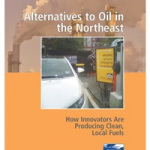Alternatives to Oil in the Northeast:
How Innovators Are Producing Clean, Local Fuels
Dependence on oil harms the Northeast’s environment and economy. Innovators and entrepreneurs are working to develop the fuels of the future: clean alternatives to oil that are less polluting and can be produced right here in the region.
Downloads
Environment New York Research & Policy Center

Dependence on oil harms the Northeast’s environment and economy. Innovators and entrepreneurs are working to develop the fuels of the future: clean alternatives to oil that are less polluting and can be produced right here in the region.
Those efforts can only take root and grow if Northeastern states make a firm policy commitment to integrating clean alternative fuels into our transportation fuel mix. Adoption of a regional Clean Fuel Standard will provide a critical shot in the arm to innovators and entrepreneurs in our region, while bringing the region closer to cutting our dependence on oil.
The Northeast’s heavy reliance on oil pollutes our air and exacerbates global warming.
-
Oil consumption contributes to global warming, which is predicted to have a heavy impact on the Northeast. By the end of the century, snow season could be half its current length. Summers will be hotter, with as many as 30 days per summer in Philadelphia with temperatures over 100° F. Higher sea levels could leave both New York City and Boston vulnerable to flooding during high tides and coastal storms like Superstorm Sandy.
-
Oil consumption causes air pollution that harms human health. Using petroleum products creates ground-level ozone (smog) and particulate matter pollution (soot). Both of these pollutants can cause or aggravate a host of health problems, including cardiovascular disease, asthma and lung cancer. More than 38 million people in Northeastern states live in areas with unhealthy air.
Businesses and consumers in the Northeast suffer financially from our dependence on oil.
-
In 2010, Northeastern consumers and businesses spent $121 billion on petroleum products, 99 percent of them from outside the region. The money was equal to more than 3 percent of all economic activity in the Northeast.
-
Our heavy reliance on oil leaves consumers vulnerable to the impact of fluctuations in petroleum prices, such as this year’s surge in gas prices to more than $4 per gallon. In the Northeast, where roughly one quarter of homes are heated with oil, many families are particularly vulnerable to jumps in oil prices.
Domestically produced, clean alternatives to oil exist today and companies across the Northeast are working to bring those fuels and technologies to consumers.
Northeastern entrepreneurs are working to make vehicles powered by electricity a clean and convenient alternative to oil-powered cars and trucks, by building the recharging infrastructure needed by electric vehicles.
-
Edison ParkFast is installing electric-vehicle charging stations at its parking facilities in New York and New Jersey. Both commuters who need to recharge a vehicle for the commute home and apartment-dwellers who don’t have a way to recharge their vehicle at home use the facilities installed by the New York-based company.
Entrepreneurs across the Northeast have developed sustainable, locally produced biofuels that they now are seeking to produce and market in bigger quantities.
-
Old Town Fuel & Fiber processes waste from Maine’s timber industry into bio-butanol that can be refined into jet fuel. With help from researchers at the University of Maine and with funding from the U.S. Department of Energy, Old Town Fuel & Fiber has designed and built a pilot plant that can be scaled up to produce and refine about 1.5 million gallons of jet fuel annually from wood waste. The company next intends to build a full-scale facility with 10 times the present capacity.
-
New York City’s thousands of restaurants generate waste cooking oil that can be purified and refined for use as biodiesel. Each month, Tri-State Biodiesel collects 250,000 gallons of waste oil from restaurants in New York City, as well as in Connecticut and New Jersey. The company then filters the oil before selling it to biodiesel refineries.
-
Matson Biofuels in Pennsylvania has developed a biodiesel refining process that can produce biodiesel from both high-quality and low-quality feedstock. The new process allows more efficient production of biodiesel that increases yield, reduces water consumption during processing, and lowers costs.
Not all alternative fuels are clean. Some alternatives to oil also produce significant amounts of global warming pollution, while others raise new environmental concerns.
-
Ethanol based on corn and biodiesel made from soybeans are energy-intensive to grow and process, and add to soil erosion and pesticide pollution.
-
Natural gas produced by hydraulic fracturing (“fracking”) may have higher emissions than petroleum.
-
Algae that have been genetically engineered can produce large volumes of oil for refining into vehicle fuel. While this algae-based oil may deliver emissions benefits, the use of genetically modified organisms raises grave concerns about potential broader ecological impacts.
Adoption of a regional Clean Fuels Standard will speed the integration of alternatives to oil into the Northeast’s fuel supply while ensuring that those alternatives deliver real benefits for the environment. Such a standard would require the use of an increasing amount of clean, alternative fuels and limit the amount of global warming pollution produced by a gallon of fuel. By adopting a Clean Fuels Standard, the region can hasten development of alternatives to oil here in the Northeast, and make sure that those alternatives contribute to a cleaner, healthier future.

